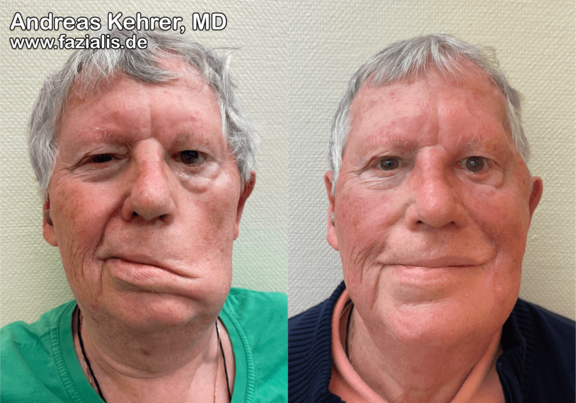Long standing facial paralysis in elderly patients may also be successfully treated with temporalis muscle transfer. This 81-year-old patient complained of the typical symptoms of slackening of the temporalis muscle: frequent unintentional salivation with constant staining of his outerwear (lack of oral competence), difficulty in food processing during the chewing process (accidental biting of the oral mucosa and retention of food residues in the cheek pocket), and slurred speech (dysarthria). After surgical repositioning of the temporalis muscle (Labbé temporalis muscle transfer), both resting symmetry and dynamic function (facial expression) improved immensely. There are several positive effects at once: 1. significantly improved symmetry due to the recreation of the nasolabial fold and tightening of the corner of the mouth with a balancing of the lips at rest. 2. now active control of the corner of the mouth and the ability of a conscious smile/laugh. 3. no more accidental salivating and biting of the buccal mucosa 4. improvement in articulation with a clearer speech pattern due to less flaccid, "vibrating" cheek tissue and improved position of the corner of the mouth. 5. Significantly improved social function and psyche of the patient.
- Home
- Facial nerve
- Facial expression
- Facial paralysis
- Treatment
- Team
- Results
- Patient pictures
- Patient 1
- Patient 2
- Patient 3
- Patient 4
- Patient 5
- Patient 6
- Patient 7
- Patient 8
- Patient 9
- Patient 10
- Patient 11
- Patient 12
- Patient 13
- Patient 14
- Patient 15
- Patient 16
- Patient 17
- Patient 18
- Patient 19
- Patient 20
- Patient 21
- Patient 23
- Patient 24
- Patient 26
- Patient 27
- Patient 28
- Patient 29
- Patient 30
- Patient 31
- Patient 32
- Patient 33
- Patient 34
- Patient videos
- Children
- Hidden scars
- Patient testimonies
- A patient story
- TV and press reports
- Patient pictures
- Science
